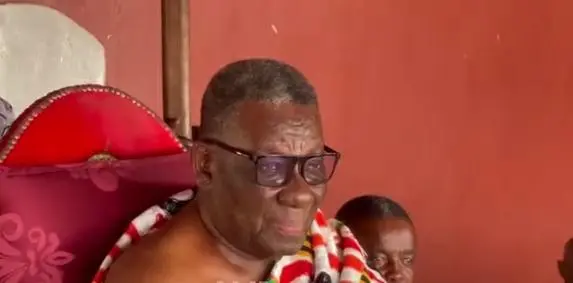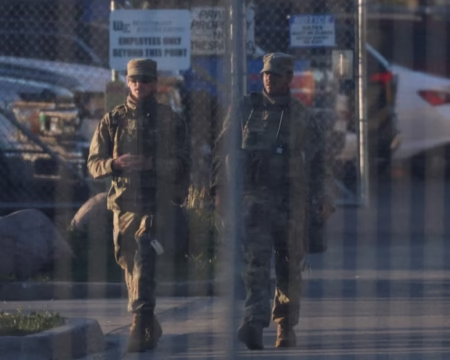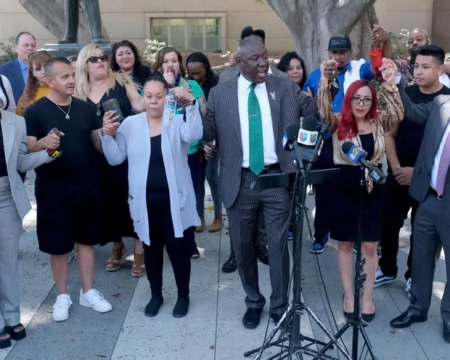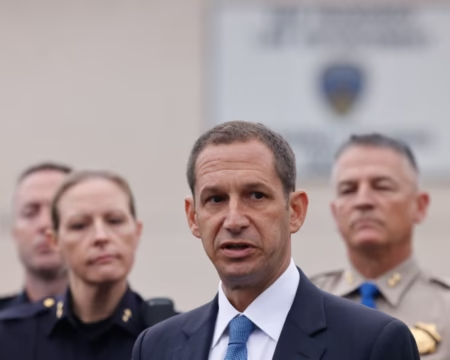The Paramount Chief of Mampong, Daasebre Osei Bonsu II, has strongly condemned the recent violence at the opposition National Democratic Congress (NDC) party office in Mampong, located in Ghana’s Ashanti Region. The incident, which involved two days of protests over the nomination of a new Municipal Chief Executive (MCE), has sparked serious concerns about rising tribal tensions in the area.
Supporters opposing the appointment clashed at the party office, accusing NDC leaders of ignoring local voices. During a meeting with party officials, the Mamponghene called for calm and urged all parties to reject tribal sentiments that could harm the unity of the region.
Chief Denounces Political Violence
The altercation occurred when groups of demonstrators, reportedly aligned with the ruling party, expressed anger over the MCE nominee. They claimed the candidate was imposed without proper consultation with local stakeholders.
“This is not the way to handle political disagreements,” said Daasebre Osei Bonsu II. “Mampong and the whole of Asanteman do not belong to any one party. We are all Ghanaians, and what happened at the NDC office was deeply unfortunate.”
The chief emphasized that such incidents tarnish the reputation of the town and the region. “I was saddened by what happened. I don’t want that to happen again.”
NDC Leadership Responds
In response to the chief’s remarks, the leadership of the NDC assured him of their commitment to resolving the issue peacefully. They promised to address the concerns raised by protesters using proper internal channels and open dialogue.
Party representatives admitted the process could have been better handled and pledged to involve local voices in future decisions to avoid similar incidents.
Warning Against Tribal Provocation
One of the most serious concerns raised by the Mamponghene was the use of tribal language during the unrest. He warned that divisive comments risk tearing apart the social fabric of the region.
“To all those who spewed those tribal sentiments, I want this reversed,” he said firmly. “I don’t want any tribal war in Mampong.”
The chief urged political leaders to show maturity, regardless of which party they belong to. He also reminded them that political roles are public responsibilities and not personal assets.
“I hear you have been summoned, and all arrangements have been made. Do the needful or face my wrath,” he stated. “If you are an executive, show leadership. The party does not belong to you—it belongs to all of us.”
A Call for Peace and Unity
The Mamponghene’s message comes at a time when political divisions in Ghana remain sensitive ahead of upcoming local and national elections. Observers believe his firm intervention could help prevent further unrest.
Political analyst Kwame Boadu told Daljoog News, “This is a crucial reminder that traditional leaders still hold significant influence in Ghana’s politics. The chief’s words will resonate deeply within the community.”
Regional Media Coverage and Public Reaction
The incident has drawn widespread media attention. Asaase Broadcasting Company, which operates on several regional frequencies including Asaase 99.5 Accra and Asaase 98.5 Kumasi, has been covering the story closely. Reports suggest community members have mixed feelings, with some supporting the protests but most condemning the violence.
Social media reactions have also been swift. Many Ghanaians are calling for dialogue and peaceful resolution, echoing the Mamponghene’s sentiments.
Historical Context of Political Tensions
Political tension over local appointments is not new in Ghana. In previous years, disagreements over MCE nominations have led to protests, especially in politically charged regions. However, the introduction of tribal elements into such disputes is a growing concern.
Experts warn that if left unchecked, these sentiments could escalate beyond political disagreements and affect community peace.
A Message of Unity and Responsibility
As Ghana moves closer to its next election cycle, the words of Daasebre Osei Bonsu II serve as a powerful reminder of the need for unity, respect, and responsible leadership.
“We must avoid anything that could divide us,” he urged. “Ghana is for all of us. Let us protect our peace and work together for progress.”







